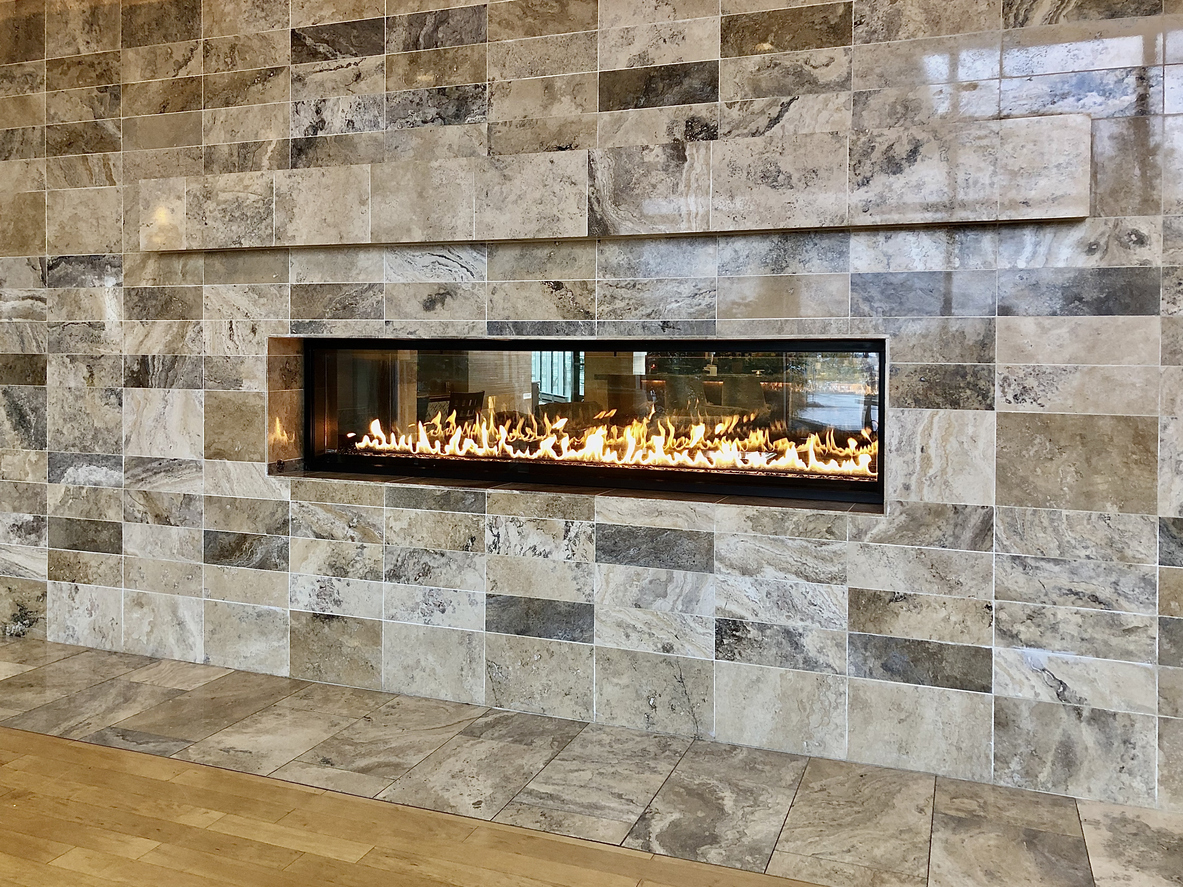

We may earn revenue from the products available on this page and participate in affiliate programs. Learn More ›
Q: A few minutes after I turned on my gas fireplace this evening, I noticed a faint gas smell. I am concerned about the possibility of a leak. Is it worrisome that my gas fireplace smells like gas?
A: A gas fireplace is a safe and low-maintenance alternative to wood-burning fireplaces that add a cozy ambiance to the home. Indoor gas fireplace owners forgo the hassle of maintaining a chimney and need only to switch on the gas when they want to enjoy a warm fire. On the other hand, it is wise to be extra cautious when you notice that something like a fireplace or an oven smells like gas. In fact, natural gas has no smell. The scent most people recognize is added as a safety precaution to alert homeowners of its presence before they ever begin experiencing slow gas-leak symptoms.
A gas fireplace that smells like gas is not a cause for concern. It means that the fireplace is functioning exactly as it should. However, excessive odor or a prolonged smell may require extra attention. Read on to learn what it means when a gas fireplace smells like gas.
It’s normal for a gas fireplace to smell when it’s first turned on.
Homeowners are wise to be wary of gas smells in the home as gas leaks are dangerous and potentially deadly. However, in the same way that it’s common to notice a burning smell the first time you activate a furnace, homeowners are likely to notice a slight gas smell in the house when they turn on a gas fireplace for the first time in a while. This can continue after the fireplace is switched on for the first few minutes. As long as the smell only appears when the fireplace is on, and it subsides within about 10 minutes, it is not cause for concern.

Proper ventilation around the fireplace and regular HVAC cleanings should mitigate any lingering gas smells.
Even if a gas smell is not always dangerous, it is not particularly pleasant. Ensuring the ventilation around the fireplace is optimized allows the gas to dissipate more quickly. Many gas fireplaces do not have chimneys, but they should have a vent system that releases fumes outdoors rather than into the home. Homeowners can consider having the fireplace regularly inspected to ensure the vents are clear and working properly. If the house still smells like gas but there’s no leak, it’s possible that the home’s air filters are past due for replacement. It’s a good idea to maintain the home’s HVAC system and have it cleaned regularly to improve air quality.
A gas fireplace can intensify other smells in the home.
Gas is not the only strong smell that can be emitted from a propane gas fireplace. A gas flame’s presence can intensify odors already lurking in the air. Fire feeds on oxygen, which can be intermingled with impurities in the air. When those impurities come into contact with the flames from the fireplace, the smell will become much more noticeable. Additionally, dust and other particles tend to settle in the fireplace during the off-season. When the fireplace is turned on and the dust starts to burn, homeowners might notice a smell similar to burnt hair. Opting for an air purifier or changing the HVAC system filters can reduce odors in the home.

The smell of gas when the fireplace is turned off could signal a gas leak.
A faint gas smell when the fireplace is on is natural—after all, the gas has to be turned on for the fireplace to work. But if users smell sulfur or gas consistently in between uses, it could be an indication that there is a leak somewhere. Ensure the gas is turned off, then try to air out the room. If the smell persists, check for other signs of a leak. These may include hissing sounds, high gas bills, the smell of rotten eggs, or dying plants. It’s also smart to ensure the carbon monoxide detector is working properly to identify gas leaks as soon as possible.
Gas leaks are serious problems that require immediate professional attention.
If there is any chance that a fireplace is leaking gas or someone in the home is experiencing gas-leak symptoms like dizziness and headaches, it’s better to “overreact” to a false alarm than to compromise health and safety. Take appropriate precautions and contact 911 or the gas company to assess the situation immediately. Remove everyone from the house, including pets, and wait outside for the services to arrive. Once the situation has been resolved and it is safe to reenter the home, have a technician inspect the fireplace before using it again. If there were a leak in the gas valve or a blockage in the vent system, they would be able to get the fireplace back in safe, working order.

Gas fireplaces are safer than wood-burning ones but still require basic maintenance and precautions.
In general, there are fewer safety risks involved with owning a gas fireplace than a wood-burning one. Gas fireplaces are contained behind a glass panel, so there are no sparks, smoke, or open flames to contend with. They also do not typically have a chimney, so homeowners don’t have to worry about producing excessive smoke.
Even so, it’s wise to have gas fireplaces maintained and inspected regularly at the start of the season to ensure everything is functioning safely. It’s also worth noting that the glass barriers surrounding gas fireplaces get quite hot, so homeowners with small children or pets will want to stay vigilant when the fireplace is in use to keep everyone at a safe distance.
